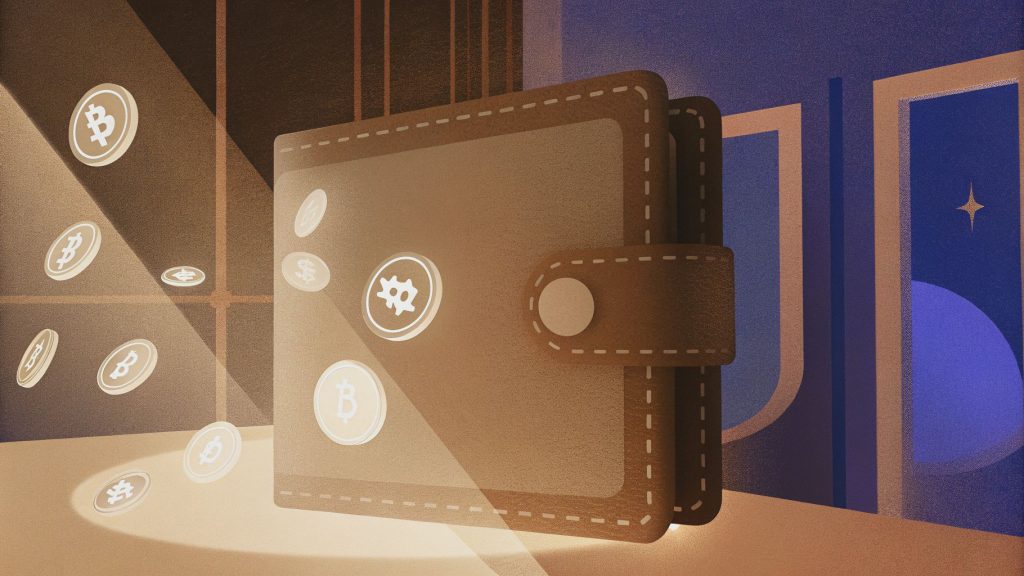Best Crypto Wallets in 2025: A FULL Guide!

The world of cryptocurrency can be confusing, especially when it comes to choosing a secure and reliable wallet to store your digital assets. With so many options available, it’s essential to understand the different types of wallets, their features, and their security measures. This comprehensive guide will explore the best crypto wallets in 2025, delve into how crypto wallets work, and provide step-by-step instructions on how to open a Bitcoin wallet.
Research Methodology
To provide accurate and up-to-date information, this guide was developed using a comprehensive research methodology. The process involved:
- Identifying Top Wallets: We researched and identified the most popular and highly-rated crypto wallets in 2025 based on factors such as security, features, and user reviews.
- Analyzing Security Features: We delved into the security features of each wallet, including encryption methods, key storage mechanisms, and vulnerability reports.
- Reviewing User Feedback: We analyzed user reviews and feedback from various sources to understand the pros and cons of each wallet from a user perspective.
- Investigating Fees and Regulations: We researched the fee structures associated with each wallet and explored the regulatory landscape for crypto wallets in different jurisdictions.
Top Crypto Wallets in 2025
| Wallet Name | Type | Supported Cryptocurrencies | Key Features | Security Features | Pros | Cons |
|---|---|---|---|---|---|---|
| Binance Wallet | Hot | 500+ | Trading tools, advanced security features | Custodial, encryption | Easy to use, fast, good customer support | Past security breaches, higher fees for low volume users |
| Coinbase Wallet | Hot | Thousands | Beginner-friendly interface, insurance for stored assets | Custodial, multi-factor authentication | Simple interface, insurance | Limited control over private keys, higher transaction fees |
| Gemini Wallet | Hot | 100+ | Secure custody, simple interface | Custodial, two-factor authentication (2FA), cold storage | Insurance for stored funds, beginner-friendly interface, strong regulatory compliance | Smaller range of supported coins, higher fees compared to competitors, limited DeFi or staking options |
| Kraken Wallet | Hot | 186+ | Advanced trading tools, margin trading, staking | 2FA, email confirmation, customizable API keys, PGP encrypted emails, real-time platform monitoring, account timeout, global time lock, SSL encryption, password requirements | High liquidity exchange, simple user interface | Complex UI for beginners, slow customer support |
| MetaMask | Hot | Ethereum, ERC-20 tokens, Layer 2 solutions like Polygon | Free and open source, easy access to DeFi and NFTs, local key storage | Non-custodial, local key storage, Secret Recovery Phrase | Free, good for DeFi and NFT users | Limited multi-chain support, requires technical know-how, vulnerable to phishing attacks |
| Phantom Wallet | Hot | Solana, Ethereum, Bitcoin, Polygon | Fast transaction speeds, Solana staking, NFT compatibility | Non-custodial, encrypted private key storage | Easy to use, built-in Solana staking and NFT management tools | Limited to the Solana ecosystem, no hardware wallet support |
| Exodus | Hot | 364 | Customer support, built-in exchange feature | Non-custodial, private keys are stored locally | Beginner-friendly, good customer support | Lacks some advanced security features |
| Trust Wallet | Hot | 70+ | Mobile-friendly, non-custodial, dApp integration | Non-custodial | Easy to use, supports a wide range of assets | Potential security vulnerabilities |
| Trezor Wallet | Cold | 1,000+ | Open-source firmware, offline storage, PIN protection | Offline storage, PIN protection, recovery seed | Easy to use, good for beginners | No touchscreen, limited coin support compared to Ledger |
| Ledger Nano X | Cold | 5,000+ | Bluetooth connectivity, user-friendly interface | Offline storage, PIN protection, recovery seed | Supports a wide range of cryptocurrencies, Bluetooth connectivity | Expensive compared to other hardware wallets |
| SafePal S1 | Cold | 10,000+ | Air-gapped signing technology, security, user-friendly mobile app | Offline storage, PIN protection, recovery seed | Budget-friendly, combines hardware and software solutions | Limited support for some less popular cryptocurrencies |
| KeepKey | Cold | 7,000+ | Simple interface, large display | Offline storage, PIN protection, recovery seed | Affordable, easy to use | Limited coin support compared to Trezor and Ledger |
Crypto Wallet Security
Security is paramount when choosing a crypto wallet. Here’s a breakdown of the security features and potential risks associated with each wallet:
- Binance Wallet: While Binance employs advanced security measures like encryption and cold storage, it has experienced security breaches in the past. In 2019, hackers stole over $40 million in Bitcoin. Insights into Binance safety from AllAboutCookies.org. More recently, a vulnerability linked to the UpdateAccountPermission function on the Tron blockchain has compromised approximately 14,545 crypto wallets. To mitigate risks, use a VPN, secure your devices against malware, and enable 2FA.
- Coinbase Wallet: Coinbase offers security measures like 2FA and biometric verification. However, a 2021 hack affected over 6,000 users, and the platform has faced lawsuits related to security incidents. NFT Evening’s 2025 safety review of Coinbase provides further details. To mitigate risks, use a strong password, enable 2FA, keep your recovery phrase safe, and be cautious of phishing attacks, as detailed in OneSafe Blog’s Coinbase security guide.
- Gemini Wallet: Gemini emphasizes security and compliance, with features like 2FA and cold storage. However, a 2022 hack raised concerns about reimbursement for lost funds, as FXEmpire’s GEMINI review notes. To mitigate risks, verify the authenticity of emails, be cautious of social engineering attacks, and use strong passwords, following Gemini’s security checklist for crypto investors.
- Kraken Wallet: Kraken has a strong security track record and has never been hacked. However, a zero-day exploit in 2024 led to a $3 million theft, according to Bitdefender’s report on the Kraken zero-day exploit. To mitigate risks, secure your devices and email accounts, and be vigilant against phishing attacks, as recommended by Kraken’s support on compromised wallets.
- BitMEX Wallet: BitMEX boasts high-security levels and has never been hacked. However, the CFTC charged BitMEX for illegally operating and breaking anti-money laundering laws, according to Investopedia’s BitMEX review. To mitigate risks, limit public exposure, secure your devices, and be aware of potential regulatory issues, as highlighted in BitMEX’s guide on account security.
- MetaMask: MetaMask is non-custodial, giving users full control of their keys. However, it’s vulnerable to phishing attacks and malicious websites, as Koinly explains in their safety assessment of MetaMask. To mitigate risks, store your seed phrase securely, use hardware wallet integration, and be cautious of phishing attempts, as detailed in MetaGameHub’s guide on MetaMask wallet protection.
- Phantom Wallet: Phantom offers security features like encrypted private key storage. However, a vulnerability reported by @CloakdDev raised concerns. Bitget News reported on Phantom’s defense of wallet safety amidst these allegations. To mitigate risks, secure your operating system, enable the auto-lockout timer, and be cautious of spam NFTs, following Phantom’s security tips for users.
- Trezor Wallet: Trezor has a long history of security. However, a January 2024 data breach exposed contact information of nearly 66,000 users, as noted in Thodex’s detailed security review of Trezor Wallet. To mitigate risks, set up a strong PIN, be aware of phishing attacks, and store your recovery seed securely, as advised by C# Corner for Trezor wallet security.
- SafePal Wallet: SafePal combines hardware and software security features. However, Kraken Security Labs found ineffective tamper detection in the SafePal S1, according to The Coin Bureau’s 2025 SafePal S1 review. To mitigate risks, enable secure fingerprint login, use address verification, and be cautious of scams, as SafePal’s security guide explains.
- KeepKey: KeepKey offers a simple cold storage solution. However, it has a vulnerability related to PIN verification, as Money.com’s KeepKey crypto wallet review points out. To mitigate risks, store the recovery seed securely, use a strong password, and be aware of potential physical vulnerabilities, according to BitDegree’s 2025 KeepKey review.
What is the Safest Crypto Wallet?
As demonstrated above, the safest crypto wallet is generally considered to be a cold wallet (hardware wallet). These wallets store your private keys offline, making them significantly less vulnerable to hacking and online attacks. However, it’s crucial to choose a reputable brand with a strong security track record and to follow best practices for securing your device and recovery seed. Britannica Money’s beginner’s guide to cryptocurrency wallets offers more on wallet basics.
How Does a Crypto Wallet Work?
Cryptocurrency wallets don’t actually store your cryptocurrencies. Instead, they function like a secure key manager, providing access to your digital assets on the blockchain. These wallets store your private keys, which are unique, complex codes that allow you to authorize transactions and prove ownership of your cryptocurrencies.
When you initiate a transaction, your wallet uses your private key to generate a digital signature, verifying your ownership and authorizing the transfer of funds. This signature is then broadcast to the blockchain network, where it is validated and added to the public ledger.
How to Open a Bitcoin Wallet
Here’s a step-by-step guide on how to open a Bitcoin wallet:
- Choose a wallet provider: Select a reputable provider that offers the type of wallet that suits your needs (hot or cold wallet). Consider factors such as security, ease of use, and supported cryptocurrencies.
- Download the software or purchase the device: If you’re using a software wallet, download the app to your desktop or mobile device. If you’re using a hardware wallet, purchase the device from a trusted source.
- Create an account: Follow the instructions provided by the wallet provider to create an account. This may involve setting up a password and verifying your identity.
- Write down your recovery phrase: Your wallet will generate a unique recovery phrase (also known as a seed phrase), which is a list of 12 or 24 words that you can use to recover your wallet if you lose access to your device or forget your password. Store this phrase in a safe and secure location.
- Add Bitcoin to your wallet: You can purchase Bitcoin directly through some wallets or transfer Bitcoin from another wallet or exchange.
Risks Associated with Using Crypto Wallets
While crypto wallets offer a secure way to store your digital assets, there are still risks involved:
- Hacking: Software wallets are vulnerable to hacking if your device is compromised.
- Phishing: Scammers may try to trick you into giving them your private keys or recovery phrase.
- Loss or damage: Hardware wallets can be lost or damaged, and paper wallets can be easily misplaced.
- User error: If you lose your recovery phrase or send cryptocurrency to the wrong address, you may lose your funds.
Mitigating Risks
To mitigate these risks, follow these best practices:
- Use a strong password and enable two-factor authentication (2FA).
- Store your recovery phrase in a safe and secure location.
- Be wary of phishing scams and avoid clicking on suspicious links.
- Keep your software and devices updated with the latest security patches.
- Consider using a hardware wallet for maximum security.
- Double-check wallet addresses before sending cryptocurrency.
- Use a reputable wallet provider with a strong security track record.
- Consider using a VPN when accessing your wallet.
- Be cautious of social engineering attacks.
- Enable secure fingerprint login and address verification.
- Store your recovery seed securely and use a strong password.
Fees Associated with Crypto Wallets
Cryptocurrency wallets often involve various fees, which can vary significantly depending on the wallet provider and the type of transaction. Common fees include:
- Trading Fees: These fees are charged when buying or selling cryptocurrencies through a wallet’s built-in exchange feature. They are typically calculated as a percentage of the transaction value. For example, Binance’s 2023 fee guide on CoinStats Blog details their flat trading fee of 0.10% for both takers and makers. Coinbase charges fees, as Milk Road’s 2025 Coinbase Wallet review explains, between 0.5% and 4.5% on trades depending on the token, volume, and payment method. Gemini charges a flat 0.5% above the current trading price, plus a transaction fee based on the amount traded, according to NerdWallet’s 2025 Gemini review. Kraken’s maker-taker fees are among the lowest in the industry, with rates varying based on the 30-day trading volume, as Investopedia’s comparison of Kraken vs. Coinbase highlights. BitMEX does not charge trading fees for Upside Profit Contracts and Downside Profit Contracts, but fees apply to Perpetual Contracts and Traditional Futures, according to TradeSanta’s BitMEX fees and contracts review. MetaMask charges a 0.875% service fee for swaps, as detailed in an Ethereum StackExchange discussion on MetaMask fees. Phantom charges a flat 0.85% fee for token swaps, as mentioned in Plisio’s overview of Phantom Solana Wallet. Trezor Suite does not charge fees for buying, selling, or exchanging cryptocurrencies, but network fees apply, as Trezor Forum discusses regarding transaction fee units. SafePal charges a 0.2% fee for Swap and Bridge orders, as per SafePal’s Swap & Bridge Fee information. KeepKey does not charge fees for deposits and withdrawals of Bitcoin, but network fees apply, according to BitDegree’s KeepKey review.
- Withdrawal Fees: These fees are charged when withdrawing cryptocurrencies from a wallet to an external address. They can be fixed or variable depending on the wallet and the cryptocurrency.
- Network Fees: These fees are charged by the blockchain network to process and confirm transactions. They vary depending on the network’s congestion and the complexity of the transaction.

Regulatory Landscape for Crypto Wallets
The regulatory landscape for crypto wallets is constantly evolving, with different jurisdictions implementing various rules and compliance requirements. Here’s an overview of the regulatory landscape for some of the wallets mentioned:
- Binance Wallet: Binance is subject to regulations in various jurisdictions and has faced challenges from regulatory authorities, as Wikipedia’s article on Binance outlines. Binance.US’s compliance page states it is a licensed and regulated U.S. crypto exchange that complies with U.S. rules and regulations.
- Coinbase Wallet: Coinbase is a regulated financial institution that complies with the rules and regulations in the jurisdictions it operates in, as Coinbase Help explains regarding regulatory compliance. The IRS’s information on digital assets clarifies that Coinbase Wallet users in the United States are subject to income and capital gains tax on their transactions.
- Gemini Wallet: Gemini is a New York trust company subject to capital reserve requirements, cybersecurity requirements, and banking compliance standards, according to Gemini’s page on insured Bitcoin wallets. The Paypers reports that Gemini chooses Malta as its European hub for MiCA compliance, aligning with EU’s Markets in Crypto-Assets (MiCA) framework.
- Kraken Wallet: Kraken’s support page on licensing and regulation mentions it maintains a registration as a Money Services Business with FinCEN in the United States. Kraken also complies with regulations in other jurisdictions, such as the United Kingdom and Canada.
- BitMEX Wallet: BitMEX’s document on ID document requirements indicates it operates under the regulations of the Seychelles. BitMEX’s risk disclosure statement for crypto trading acknowledges past regulatory challenges, including CFTC charges.
- MetaMask: MetaMask, as a non-custodial wallet, isn’t directly subject to centralized exchange regulations, but CoinLedger clarifies user tax responsibilities with MetaMask.
- Phantom Wallet: Similarly, Phantom, being non-custodial, isn’t directly regulated like exchanges, but CoinLedger explains tax reporting for Phantom Wallet users, highlighting user responsibility for tax compliance.
- Trezor Wallet: Trezor hardware wallets aren’t directly regulated as exchanges, but Trezor’s privacy policy implies users must still adhere to tax laws.
- SafePal Wallet: SafePal’s terms of service note it’s a decentralized wallet without KYC requirements, but users are still responsible for tax compliance.
- KeepKey: KeepKey hardware wallets, like Trezor, aren’t directly regulated exchanges, but KeepKey’s terms of use suggest users must comply with relevant tax regulations.
Conclusion and Key Takeaways
Choosing the right crypto wallet is a crucial step in your cryptocurrency journey. By understanding the different types of wallets, their features, security measures, associated fees, and the regulatory landscape, you can make an informed decision that aligns with your needs and risk tolerance.
This guide has provided a comprehensive overview of the best crypto wallets in 2025, explained how crypto wallets work, and offered step-by-step instructions on how to open a Bitcoin wallet. By following the best practices outlined in this guide, you can ensure the safety and security of your digital assets.
When selecting a wallet, consider the following:
- Security: Prioritize security features, especially if you’re holding a significant amount of cryptocurrency. Cold wallets generally offer the highest level of security.
- Ease of Use: Choose a wallet with a user-friendly interface that suits your technical expertise.
- Supported Cryptocurrencies: Ensure the wallet supports the cryptocurrencies you want to store and manage.
- Fees: Be aware of the fees associated with using the wallet, such as trading fees, withdrawal fees, and network fees.
- Regulations: Understand the regulatory landscape for crypto wallets in your jurisdiction and ensure the wallet complies with relevant regulations.
Based on our research, here are some recommendations:
- Beginners: Coinbase Wallet or Trezor Wallet are good options for beginners due to their user-friendly interfaces and comprehensive features.
- Active Traders: Binance Wallet or Kraken Wallet are suitable for active traders due to their advanced trading tools and support for a wide range of cryptocurrencies.
- Long-term Investors: Cold wallets like Ledger Nano X or SafePal S1 are recommended for long-term investors due to their enhanced security for storing large amounts of cryptocurrency.
- Ethereum Users: MetaMask is a popular choice for users heavily involved in the Ethereum ecosystem and DeFi applications.
- Solana Users: Phantom Wallet is optimized for the Solana blockchain and offers seamless integration with Solana dApps.
Ultimately, the best crypto wallet for you depends on your individual needs and preferences. By carefully considering the factors outlined in this guide, you can choose a wallet that provides the security, functionality, and ease of use you need to navigate the world of cryptocurrency with confidence.

